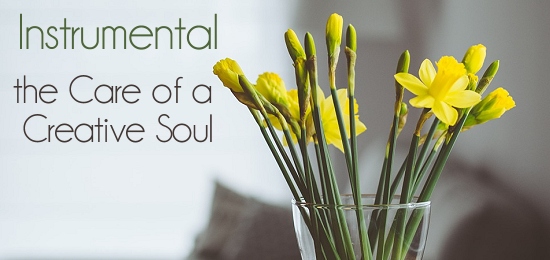
We’ve been under the powerful influence of retrograde planets lately. We’ve just completed a Venus retrograde and right on its heels, a Mercury retrograde began. A long list of “re-”s accompany these retrogrades: regret, remorse, review, redo, revisit, revise, re-evaluate; sometimes the “re”turn of ghosts from the past. All of these can be gifts to us. They’re an invitation to look to the past for what’s “re”levant and use it to our best benefit in the present.
The Venus retrograde through Libra and Scorpio increased passion and sexual tension. This affected real-time interactions with current or former lovers and partners – or both. It also affected dreams and memories, with the past springing up at unexpected moments.
Did you feel a longing for the past? Did your memories of a relationship with a former lover make you feel uncomfortable? Sad? Aroused?
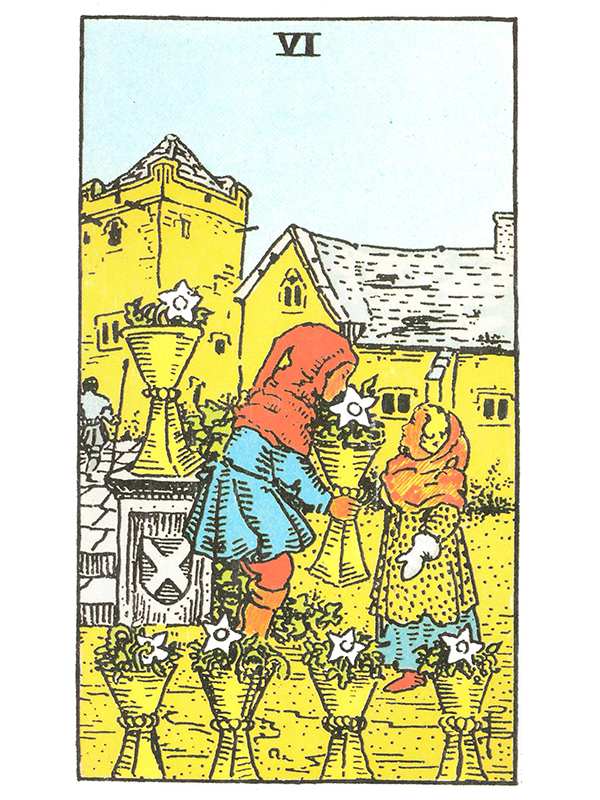 My own surfacing memories prompted me to meditate on the Six of Cups – the Minor Arcana Tarot card that keys to reminiscence, return and memories of past experiences and associations. In short, the card is symbolic of nostalgia. This card’s astrological correspondence is the Sun in Scorpio.
My own surfacing memories prompted me to meditate on the Six of Cups – the Minor Arcana Tarot card that keys to reminiscence, return and memories of past experiences and associations. In short, the card is symbolic of nostalgia. This card’s astrological correspondence is the Sun in Scorpio.
In the Rider-Waite-Smith Tarot there is less emphasis on the sexual aspects of the Sun in Scorpio. Its general meanings are nostalgia, revisiting the past, recalling childhood memories, and also joy and pleasure. In reverse and under the influence of the Venus retrograde – we may have discovered that we were clinging to the past or trying to live in the past; dwelling on past hurts and disappointments; yearning for past relationships or people that were not healthy for us or that we’ve outgrown and no longer serve us.
Using the Crowley-Harris or Thoth Tarot, the general meaning of the card is more centrally focused on the most natural expression of the Sun in Scorpio. All forms of pleasure – including sexual fulfillment – are inherent in this card. There is both a depth and a natural transcendence here that goes beyond the momentary gratification of desire. In union with another, the whole is greater than the sum of its parts. This is our highest consciousness expressed through our emotions and feelings. If ill-dignified – as is possible under the influence of retrograde Venus transiting Scorpio – unhealthy sexual expression, jealousy and attracting the wrong partners may have been the outcome.
Our longing for the past – that sometimes inexplicable deep-dive into memories and feelings – all slightly tinged with melancholy, can take up a lot of emotional real estate.
I experienced a series of highly-detailed and vivid dreams about some of my past lovers. On many mornings I woke feeling almost hungover, thinking about the past and re-experiencing feelings I hadn’t examined for many years. I will confess to some quick Google searches (I plead human frailty). To my credit, I didn’t take any impulsive or potentially destructive actions.
But I did allow myself to reframe my feelings and put them into the context of my present life (pretty damn good) and my present relationship (damn good). I can’t claim to have learned something completely new but I was able to look at the present from a refreshed, positive and contented perspective. The gift of a retrograde indeed.
Then, just as Venus stationed direct on November 16th, Mercury went retrograde. Although it will spend a brief portion of this retrograde in Scorpio, most of this transit will be through Sagittarius. During 2018 all of the Mercury retrograde periods have been in Fire signs – Aries, Leo and now Sagittarius.
The energy of Mercury in Sagittarius can be difficult to manage. This planet and the sign have much in common such as communication, travel and education. But Mercury the Messenger is more concerned with the local, short-term and specific while Sagittarius the Archer has his arrow aimed at the higher, long-term and global aspects of these areas. Reconciling these as complementary energies or allowing them to cause conflict is the challenge.
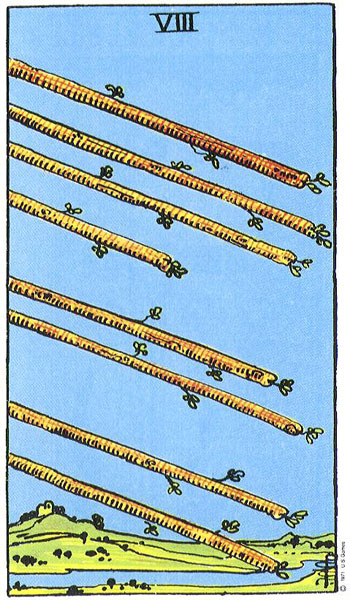 The Minor Arcana Tarot Card corresponding to Mercury in Sagittarius is the Eight of Wands. Both the Rider-Waite-Smith and Crowley-Harris (Thoth) Tarot share the general meaning of this card: swiftness, action, ambition, travel and rapid transmission of information; dynamic events and communication.
The Minor Arcana Tarot Card corresponding to Mercury in Sagittarius is the Eight of Wands. Both the Rider-Waite-Smith and Crowley-Harris (Thoth) Tarot share the general meaning of this card: swiftness, action, ambition, travel and rapid transmission of information; dynamic events and communication.
When reversed or ill-dignified as they may be under the influence of Mercury retrograde – there may be communication breakdowns, misunderstandings, technological glitches or failures, anxiety, tension, delayed or canceled travel plans and a slow-down or stop to our activities.
In addition this retrograde shares with the Venus retrograde the tendency to dwell on former experiences, reminisce about the past, or unexpectedly meet up with people from your past.
See? True to retrograde form, we’ve returned to where we started. Catch you on the flip side.
About the Author: Dona Murphy
 Dona Murphy is the owner of Destiny Tarot. She lives and works in Lake Bluff Illinois as a Tarot reader, Intuitive Counselor and Life Coach. Dona combines her metaphysical and spiritual studies, natural gifts and real-world experience to help her clients solve problems and live their best lives. As she says, “The cards don’t predict your future, they help you create it”.
Dona Murphy is the owner of Destiny Tarot. She lives and works in Lake Bluff Illinois as a Tarot reader, Intuitive Counselor and Life Coach. Dona combines her metaphysical and spiritual studies, natural gifts and real-world experience to help her clients solve problems and live their best lives. As she says, “The cards don’t predict your future, they help you create it”.

 Dona Murphy is the owner of Destiny Tarot. She lives and works in Lake Bluff Illinois as a Tarot reader, Intuitive Counselor and Life Coach. Dona combines her metaphysical and spiritual studies, natural gifts and real-world experience to help her clients solve problems and live their best lives. As she says, “The cards don’t predict your future, they help you create it”.
Dona Murphy is the owner of Destiny Tarot. She lives and works in Lake Bluff Illinois as a Tarot reader, Intuitive Counselor and Life Coach. Dona combines her metaphysical and spiritual studies, natural gifts and real-world experience to help her clients solve problems and live their best lives. As she says, “The cards don’t predict your future, they help you create it”.
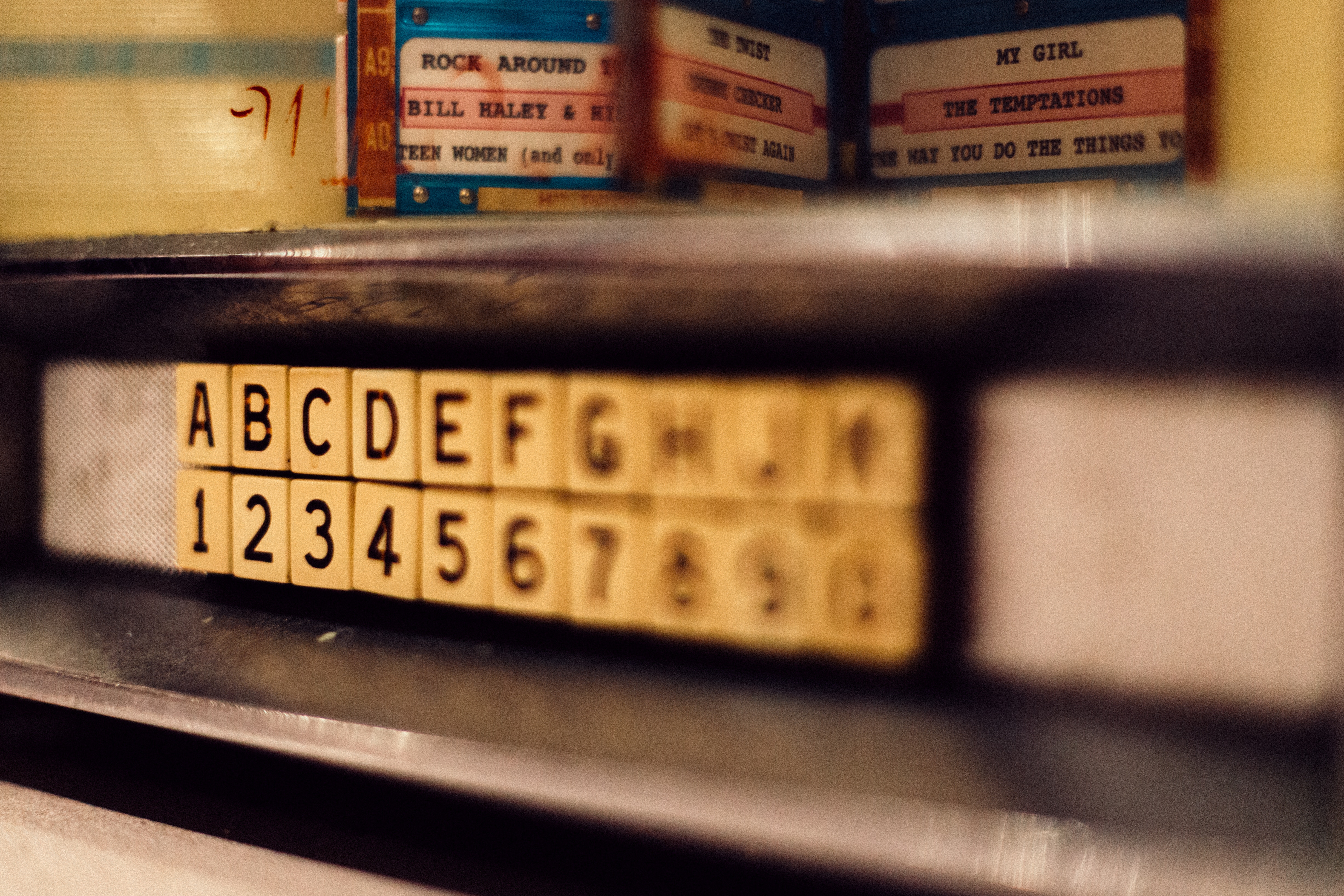
 Pat Phillips West lives in Olympia, WA. A Pushcart and Best of the Net nominee, her work has appeared in Haunted Waters Press, Persimmon Tree, VoiceCatcher, San Pedro River Review, Slipstream, Gold Man Review and elsewhere.
Pat Phillips West lives in Olympia, WA. A Pushcart and Best of the Net nominee, her work has appeared in Haunted Waters Press, Persimmon Tree, VoiceCatcher, San Pedro River Review, Slipstream, Gold Man Review and elsewhere.
 My own surfacing memories prompted me to meditate on the Six of Cups – the Minor Arcana Tarot card that keys to reminiscence, return and memories of past experiences and associations. In short, the card is symbolic of nostalgia. This card’s astrological correspondence is the Sun in Scorpio.
My own surfacing memories prompted me to meditate on the Six of Cups – the Minor Arcana Tarot card that keys to reminiscence, return and memories of past experiences and associations. In short, the card is symbolic of nostalgia. This card’s astrological correspondence is the Sun in Scorpio. The Minor Arcana Tarot Card corresponding to Mercury in Sagittarius is the Eight of Wands. Both the Rider-Waite-Smith and Crowley-Harris (Thoth) Tarot share the general meaning of this card: swiftness, action, ambition, travel and rapid transmission of information; dynamic events and communication.
The Minor Arcana Tarot Card corresponding to Mercury in Sagittarius is the Eight of Wands. Both the Rider-Waite-Smith and Crowley-Harris (Thoth) Tarot share the general meaning of this card: swiftness, action, ambition, travel and rapid transmission of information; dynamic events and communication.




 Bernie Brown lives in Raleigh, NC where she writes, reads, sews, and watches birds. Her stories have appeared in Modern Creative Living, Belle Reve, Still Crazy, the Raleigh News and Observer, and several more. She has been nominated for a Pushcart Prize, is a Writer in Residence at the Weymouth Center, and a member of Women’s Fiction Writers Association. One of her stories will appear in an upcoming anthology of short story contest winners from Grateful Steps Publishing. She is currently trying to find a publisher for her first novel. Get to know her better at bablossom.wixsite.com/bernie-brown-writer.
Bernie Brown lives in Raleigh, NC where she writes, reads, sews, and watches birds. Her stories have appeared in Modern Creative Living, Belle Reve, Still Crazy, the Raleigh News and Observer, and several more. She has been nominated for a Pushcart Prize, is a Writer in Residence at the Weymouth Center, and a member of Women’s Fiction Writers Association. One of her stories will appear in an upcoming anthology of short story contest winners from Grateful Steps Publishing. She is currently trying to find a publisher for her first novel. Get to know her better at bablossom.wixsite.com/bernie-brown-writer.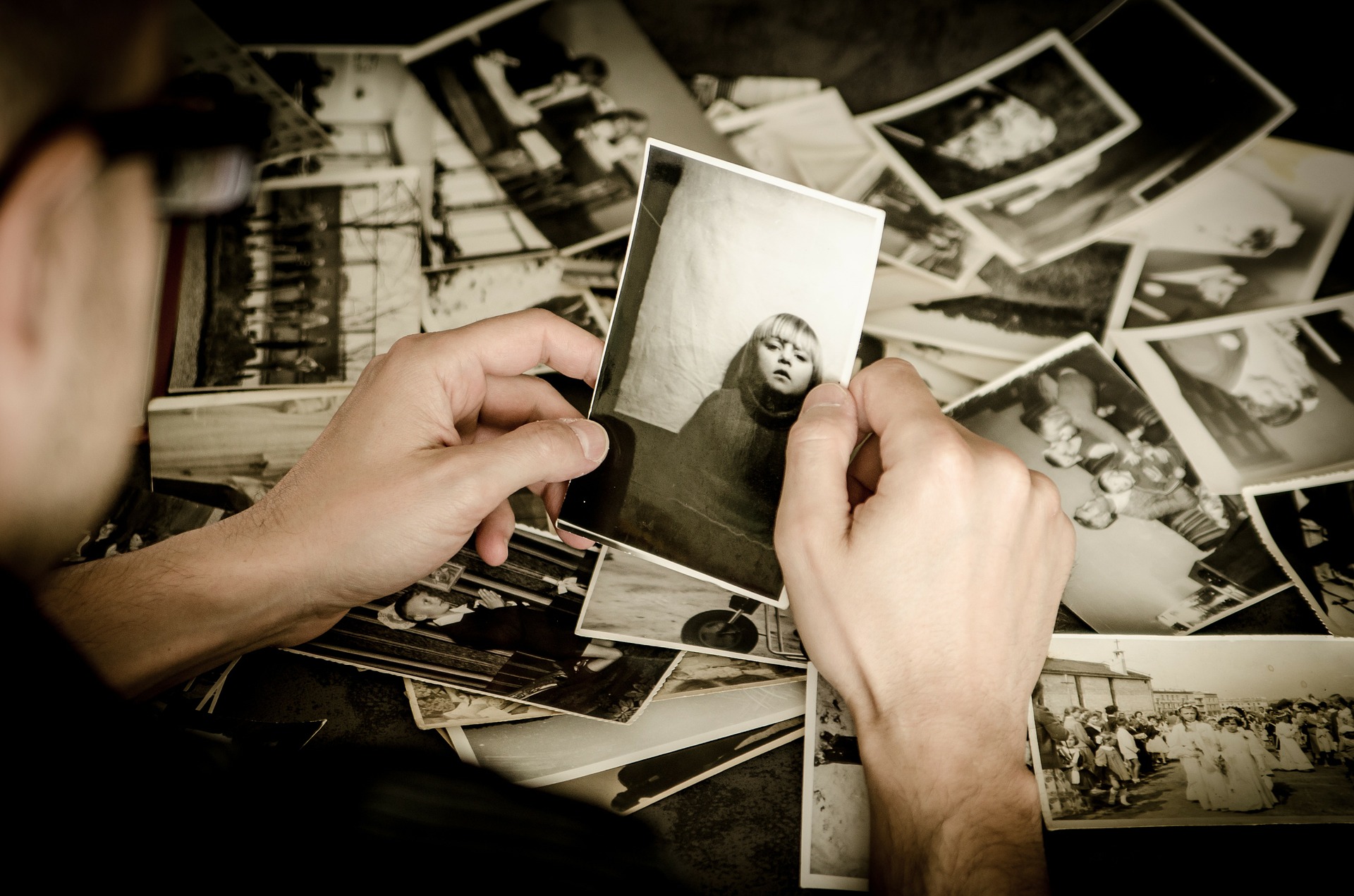

 Megan Gunnell i
Megan Gunnell i
 Patricia Wellingham-Jones is a widely published former psychology researcher and writer/editor. She has a special interest in healing writing, with poems recently in The Widow’s Handbook (Kent State University Press). Chapbooks include Don’t Turn Away: poems about breast cancer, End-Cycle: poems about caregiving, Apple Blossoms at Eye Level, Voices on the Land and Hormone Stew.
Patricia Wellingham-Jones is a widely published former psychology researcher and writer/editor. She has a special interest in healing writing, with poems recently in The Widow’s Handbook (Kent State University Press). Chapbooks include Don’t Turn Away: poems about breast cancer, End-Cycle: poems about caregiving, Apple Blossoms at Eye Level, Voices on the Land and Hormone Stew.

 In despair at her daughter’s
In despair at her daughter’s
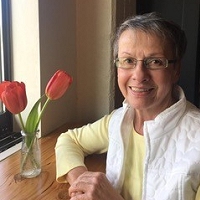 Pat Phillips West lives in Olympia, WA. A Pushcart and Best of the Net nominee, her work has appeared in Haunted Waters Press, Persimmon Tree, VoiceCatcher, San Pedro River Review, Slipstream, Gold Man Review and elsewhere.
Pat Phillips West lives in Olympia, WA. A Pushcart and Best of the Net nominee, her work has appeared in Haunted Waters Press, Persimmon Tree, VoiceCatcher, San Pedro River Review, Slipstream, Gold Man Review and elsewhere.